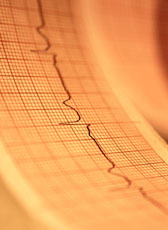 |
 |
 |
||
    |
||||
|
||||
|
Other Health Topics:
Atrial Fibrillation
Also called: AF
An arrhythmia is a problem with the speed or rhythm of the heartbeat. Atrial fibrillation (AF) is the most common type of arrhythmia. The cause is a disorder in the heart’s electrical system. Often, people who have AF may not even feel symptoms. But you may feel
AF can lead to an increased risk of stroke. In many patients, it can also cause chest pain, heart attack, or heart failure. Doctors diagnose AF using family and medical history, a physical exam, and a test called an electrocardiogram (EKG), which looks at the electrical waves your heart makes. Treatments include medicines and procedures to restore normal rhythm. National Heart, Lung, and Blood Institute
Start Here
|
| Home | Health Topics | Drugs & Supplements | Encyclopedia | Dictionary | News | Directories | Other Resources | |
| Disclaimers | Copyright | Privacy | Accessibility | Quality Guidelines U.S. National Library of Medicine, 8600 Rockville Pike, Bethesda, MD 20894 National Institutes of Health | Department of Health & Human Services |
Date last updated: 27 April 2009 Topic last reviewed: 13 April 2009 |


